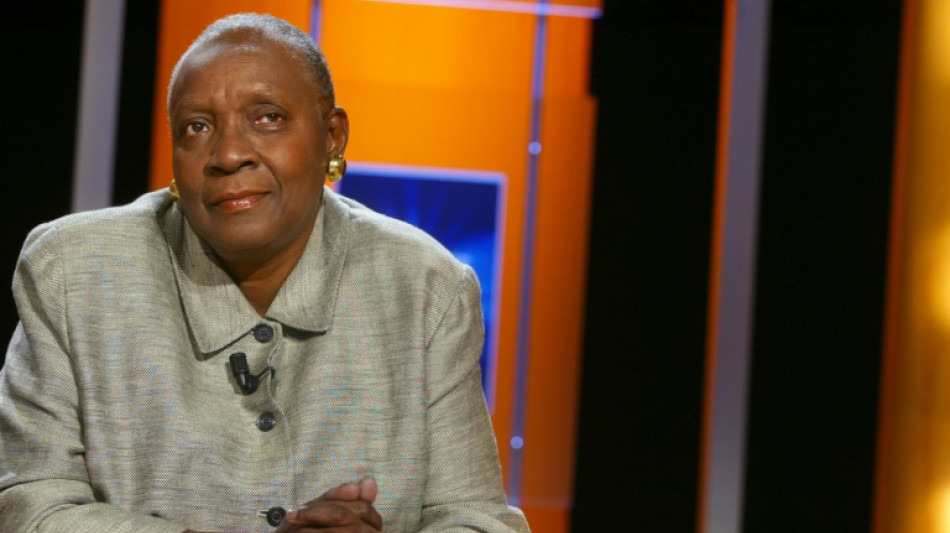
-
 Deadly storm sparks floods in Spain, disrupts Portugal vote
Deadly storm sparks floods in Spain, disrupts Portugal vote
-
Ukrainian flag bearer proud to show his country is still standing

-
 Carney scraps Canada EV sales mandate
Carney scraps Canada EV sales mandate
-
Morocco says evacuated 140,000 people due to severe weather

-
 Spurs boss Frank says Romero outburst 'dealt with internally'
Spurs boss Frank says Romero outburst 'dealt with internally'
-
Giannis suitors make deals as NBA trade deadline nears

-
 Carrick stresses significance of Munich air disaster to Man Utd history
Carrick stresses significance of Munich air disaster to Man Utd history
-
Record January window for transfers despite drop in spending

-
 'Burned inside their houses': Nigerians recount horror of massacre
'Burned inside their houses': Nigerians recount horror of massacre
-
Iran, US prepare for Oman talks after deadly protest crackdown

-
 Winter Olympics opening ceremony nears as virus disrupts ice hockey
Winter Olympics opening ceremony nears as virus disrupts ice hockey
-
Mining giant Rio Tinto abandons Glencore merger bid

-
 Davos forum opens probe into CEO Brende's Epstein links
Davos forum opens probe into CEO Brende's Epstein links
-
ECB warns of stronger euro impact, holds rates

-
 Famine spreading in Sudan's Darfur, warn UN-backed experts
Famine spreading in Sudan's Darfur, warn UN-backed experts
-
Lights back on in eastern Cuba after widespread blackout

-
 Russia, US agree to resume military contacts at Ukraine talks
Russia, US agree to resume military contacts at Ukraine talks
-
Greece aims to cut queues at ancient sites with new portal

-
 No time frame to get Palmer in 'perfect' shape - Rosenior
No time frame to get Palmer in 'perfect' shape - Rosenior
-
Stocks fall as tech valuation fears stoke volatility

-
 US Olympic body backs LA28 leadership amid Wasserman scandal
US Olympic body backs LA28 leadership amid Wasserman scandal
-
Gnabry extends Bayern Munich deal until 2028

-
 England captain Stokes suffers facial injury after being hit by ball
England captain Stokes suffers facial injury after being hit by ball
-
Italy captain Lamaro amongst trio set for 50th caps against Scotland

-
 Piastri plays down McLaren rivalry with champion Norris
Piastri plays down McLaren rivalry with champion Norris
-
ECB holds interest rates as strong euro causes jitters

-
 Spain, Portugal face floods and chaos after deadly new storm
Spain, Portugal face floods and chaos after deadly new storm
-
EU close to sealing trade deal with Australia

-
 German Cup final to stay in Berlin until 2030
German Cup final to stay in Berlin until 2030
-
What does Iran want from talks with the US?

-
 Taming the lion: Olympians take on Bormio's terrifying Stelvio piste
Taming the lion: Olympians take on Bormio's terrifying Stelvio piste
-
Wind turbine maker Vestas sees record revenue in 2025

-
 Italy's Casse tops second Olympic downhill training
Italy's Casse tops second Olympic downhill training
-
Anti-doping boss 'uncomfortable' with Valieva's coach at Olympics

-
 Bitcoin under $70,000 for first time since Trump's election
Bitcoin under $70,000 for first time since Trump's election
-
'I am sorry,' embattled UK PM tells Epstein victims

-
 England's Brook predicts record 300-plus scores at T20 World Cup
England's Brook predicts record 300-plus scores at T20 World Cup
-
Ukraine, Russia swap prisoners, US says 'work remains' to end war

-
 Wales' Rees-Zammit at full-back for Six Nations return against England
Wales' Rees-Zammit at full-back for Six Nations return against England
-
Sad horses and Draco Malfoy: China's unexpected Lunar New Year trends

-
 Hong Kong students dissolve pro-democracy group under 'severe' pressure
Hong Kong students dissolve pro-democracy group under 'severe' pressure
-
Germany claws back 59 mn euros from Amazon over price controls

-
 Germany claws back 70 mn euros from Amazon over price controls
Germany claws back 70 mn euros from Amazon over price controls
-
VW and Stellantis urge help to keep carmaking in Europe

-
 Stock markets drop amid tech concerns before rate calls
Stock markets drop amid tech concerns before rate calls
-
BBVA posts record profit after failed Sabadell takeover

-
 UN human rights agency in 'survival mode': chief
UN human rights agency in 'survival mode': chief
-
Greenpeace slams fossil fuel sponsors for Winter Olympics

-
 Greenpeace slams fossel fuel sponsors for Winter Olympics
Greenpeace slams fossel fuel sponsors for Winter Olympics
-
Kinghorn, Van der Merwe dropped by Scotland for Six Nations opener

| CMSC | -0.17% | 23.48 | $ | |
| SCS | 0.12% | 16.14 | $ | |
| NGG | -0.71% | 87.17 | $ | |
| RBGPF | 0.12% | 82.5 | $ | |
| RYCEF | -0.36% | 16.62 | $ | |
| RIO | -4.49% | 92.335 | $ | |
| CMSD | 0.21% | 23.92 | $ | |
| GSK | 3.44% | 59.27 | $ | |
| BTI | 0.61% | 62.01 | $ | |
| BCE | -4.2% | 25.279 | $ | |
| RELX | 0.73% | 30 | $ | |
| BCC | -2.52% | 88.01 | $ | |
| VOD | -6.98% | 14.685 | $ | |
| AZN | 0.78% | 188.92 | $ | |
| BP | -2.42% | 38.275 | $ | |
| JRI | 0.3% | 13.19 | $ |

Maryse Conde: Daring storyteller who explored black identity
French writer Maryse Conde, who died on Tuesday at the age of 90, became one of the greatest chroniclers of the struggles and triumphs of the descendants of Africans taken as slaves to the Caribbean.
But the writer born in the Caribbean island of Guadeloupe did not pen her first book until she was nearly 40, and it triggered a controversy that saw authorities in several countries order the copies destroyed.
The mother of four, who once said she "did not have the confidence to present her writing to the outside world", was in her eighties before she won a major award, in 2018.
The New Academy Prize -- rushed into existence in Sweden when the Nobel Literature Prize was halted over a rape scandal -- praised how Conde "describes the ravages of colonialism and post-colonial chaos in a language which is both precise and overwhelming".
By then the francophone novelist, with close cropped grey hair, was confined to a wheelchair with a degenerative disease.
But she was delighted, saying in a video message that the Caribbean island of Guadeloupe, which is part of France, was normally "only mentioned when there are hurricanes or earthquakes".
- Called out African dictators -
As well as tackling racism, sexism and a multitude of black identities over 30 books, Conde was one of the first to call out the corruption of newly independent African states.
Her first book "Heremakhonon", which means "Waiting for Happiness" in the Malinke language of West Africa, caused a scandal in 1976 and three West African countries ordered the copies destroyed.
"In those days, the entire world was talking of the success of African socialism," she later wrote.
"I dared to say that... these countries were victims of dictators prepared to starve their populations."
She found popular and critical success with novels like "Segu" and "I, Tituba, Black Witch of Salem", but Conde still felt snubbed by the French literary establishment, never winning its top prizes.
There was belated recognition in 2020, when President Emmanuel Macron paid tribute to "the fights she has waged, and more than anything this kind of fever she carries within her," awarding her the Grand Cross of the National Order of Merit.
- Black awakening -
Conde's life was almost as eventful as one of her historical novels.
Born on February 11, 1934, as Maryse Boucolon, she grew up the youngest of eight children in a middle-class family in Guadeloupe, a French island in the Caribbean, and only became aware she was black when she left to go to an elite school in Paris when she was 19.
Growing up, she had not heard of slavery nor Africa, and her mother -- a schoolteacher -- banned the use of Creole at home.
Her literary imagination had been fired by Emily Bronte's "Wuthering Heights", which she later transplanted to the Caribbean in "Windward Heights".
In Paris her mind was opened to questions of identity when she met the Martinique writer and politician Aime Cesaire, one of the founders of the negritude literary movement that sought to reclaim black history and reject French colonial racism.
But unlike him, Conde was a passionate believer in independence from France.
"I understand that I am neither French nor European," she said in a 2011 documentary. "That I belong to another world and that I have to learn to tear up lies and discover the truth about my society and myself."
- Dramatic life -
Conde fell for a Haitian journalist, who left her when she got pregnant. Unmarried and with a small boy, she gave up on university.
Three years later she married Mamadou Conde, an actor from Guinea, and they moved to the west African country.
It fulfilled a need to explore her African roots, but life in the capital Conakry was tough. "Four children to feed and to protect in a city where there is nothing, it was not easy," she recalled.
Her marriage to Conde fell apart and she moved to Ghana and then Senegal, eventually marrying Richard Philcox, a British teacher who became her translator and, she would say, offered her the "calm and serenity" to become a writer.
She followed the scandal of "Heremakhonon", which centred on a Caribbean woman's disillusioned experience in Africa, with her "Segu" novels, set in the Bambara Empire of 19th-century Mali.
Then she published "I, Tituba, Black Witch of Salem" in 1986, about a slave who became one of the first women accused of witchcraft during the 1692 Salem witch trials in the United States.
That won her American acclaim, and Conde lived in New York for 20 years, founding the Center for Francophone Studies at Columbia University before moving to the south of France.
Her later works tended to be more autobiographical, including "Victoire: My Mother's Mother", about her grandmother who was a cook for a white Guadeloupean family.
T.Khatib--SF-PST




